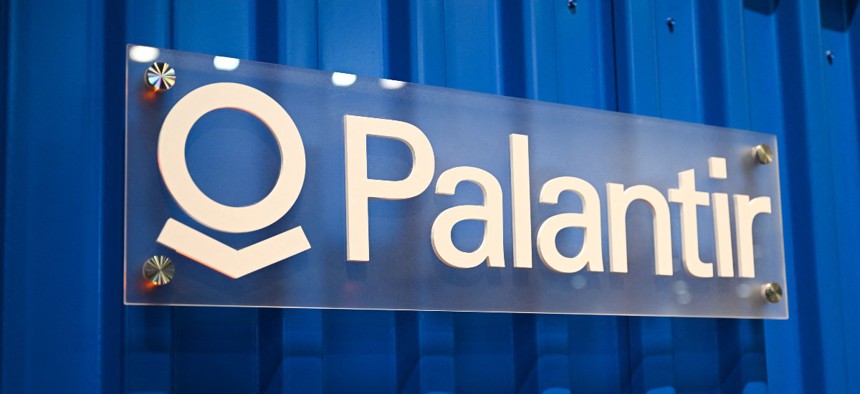Palantir's teaming approach on display in $178M Army targeting tech win

The Palantir logo on display in its booth during the Consumer Electronics Show in Las Vegas in January 2023. Photo by Patrick T. Fallon / AFP via Getty Images
Our eyes go immediately to Palantir's lineup of industry partners for the "TITAN" program that show both disruption and teaming, especially when seeing both longstanding and emerging players on the list.
In this era of being a public company, Palantir's approach to the U.S. government market has evolved from largely going it alone to increasingly working well with others.
Exhibit A of that shift is now on display after the Army chose Palantir to produce a new software-centric ground system for connecting data-gathering sensors and soldiers in the field to aid them in targeting from a distance.
Palantir will build the Tactical Intelligence Targeting Access Node ground station prototypes under a new $178.4 million Other Transaction Authority contract announced Tuesday. This third-phase OTA calls for 10 prototypes, which Palantir will design to link up with high-altitude and space sensors.
The big data software company also looks to have fended off Raytheon in a head-to-head competition. The Army structured TITAN as a three-year design and prototyping effort, during which users tested the offerings and provide feedback to inform the companies on what is needed.
But our eyes go right toward Palantir's roster of teammates it lined up to secure the TITAN program, given how the company has casted itself as a disruptor and a desired partner.
Palantir will integrate systems, technologies and software from the likes of Anduril Industries, L3Harris Technologies, Northrop Grumman, Pacific Defense, Sierra Nevada Corp., Strategic Technology Consulting and World Wide Technology.
Those are the companies Palantir cited in its announcement of the TITAN win and there are likely more, given the company uses the word "including" before the list of partners.
Like Palantir, Anduril's path in the government market has been one of disruption through a heavy emphasis on software in its offerings. Anduril has also gradually added more hardware into its portfolio of products, a shift highlighted by its entry into solid rocket motor production.
SNC is a privately held and founder-led participant in what many call the New Space Economy, while Pacific Defense is looking to lead in the electromagnetic spectrum. Strategic Technology Consulting is part of Arcfield, a systems engineering provider, and World Wide Technology is one of the world's largest IT services companies.
Then we have Northrop and L3Harris on the TITAN team. They simply need no introduction or explanation of who they are to defense industry stakeholders and watchers.
Palantir has made it no secret that they want to take share from many of the federal market's leading systems integrators. But as for blue chip defense companies, Palantir appears to be looking at that group through a different lens.
In a November earnings call with investors, Palantir's chief technology officer Shyam Sankar said those larger primes are both potential business partners and customers for his company.
"There's a lot of talk in defense tech circles about disrupting the primes, and I think there's incredible opportunity to transform what's possible with software," Sankar told analysts at the time. "They're crucial to our national security and that's because production does matter. You have to bend metal at the end of the day, and using 10 years of munitions in 10 weeks in Ukraine really underscores that point."
The lines between hardware and software are disappearing as time goes on and when it comes to TITAN, the Army is viewing those two types of products as one-and-the-same.
Palantir will absolutely drive the software side of TITAN, but that also sets the order for how the hardware goes into the systems. This particular approach to teaming also sets out how Palantir is likely to pursue similar programs.
Either way, this is a case study in disruption to watch and one with a more friendly appearance to it versus when Palantir listed on the public markets in 2021.
Heads they win, tails they win seems to be Palantir's North Star.
